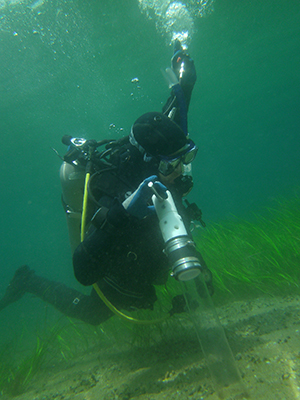About Scientific Diving at EPA

EPA's diving program dates back to 1970 when the Agency was first created. Our first dive units were established in Seattle and Gulf Breeze, Florida, to support EPA's monitoring, research, and emergency response efforts.
What is scientific diving?
At EPA, our divers are generally data gatherers, note takers, photographers.
We observe and document changes to aquatic environments, many of which are linked to human activities.
Below are some examples of the diverse type of work that we do:
- Sampling submerged drums of unknown materials.
- Mapping illegal underwater dump sites.
- Studying benthic communities at dredged material disposal sites.
- Inspecting waste discharges from seafood processing facilities.
- Assessing the health of seagrass meadows, coral reefs, and other important marine habitats.
Working with other agencies
Our divers primarily support EPA's programs, but we also participate in joint diving activities under formal reciprocity agreements with a variety of organizations, including other federal and state agencies, universities, and private sector groups.
In the past, EPA has established reciprocity agreements with organizations such as:
- U. S. Department of Commerce, National Oceanic and Atmospheric Administration
- U. S. Geological Survey
- Alaska Department of Fish and Game
- U.S. Fish and Wildlife Service
- Scientific Diving International
- Oregon State University
- Massachusetts Division of Marine Fisheries
- Oregon Coast Aquarium
- University of Washington
If your agency or organization is interested in conducting a joint diving project with EPA, please contact Scott Grossman (grossman.scott@epa.gov), 732-452-6407.
